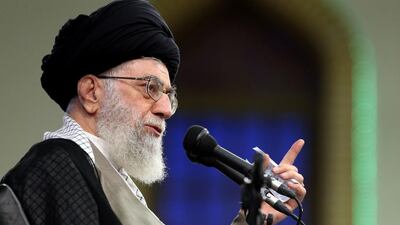Last week, Iran’s supreme leader Ali Khamenei urged Palestinians to wage another uprising against Israel. The intention was to show support for the Palestinian cause. However, the effect is patronising, as if Palestinians need to be instructed to fight for their rights, least of all by someone who has not shared their experience.
“Protecting Palestinian identity … is a necessity and a holy jihad,” said Mr Khamenei, without detailing any tangible Iranian support to this end. Palestinians have for some time been waging what is termed an “intifada of individuals”. That this has not turned into a national uprising is not due to lack of will or an improvement in their situation, but because circumstances on the ground – geographically, politically, economically and militarily – do not allow it.
Mr Khamenei’s comments suggest an ignorance of these circumstances that seems callous. It is as if the immense price the already beleaguered Palestinians would have to pay for another national intifada – even if it were possible, and with no hope of success in the present climate – is irrelevant. It may indeed be irrelevant if the aim of Mr Khamenei’s encouragement is not to serve Palestinian interests but Tehran’s.
Israeli threats to attack Iran’s nuclear facilities were blunted by the nuclear deal, because Israel’s most important allies were then invested in maintaining the agreement, which would almost certainly unravel if Israel launched an attack.
Barack Obama, who has portrayed the nuclear deal as among his greatest foreign-policy achievements, was thus willing to accommodate Tehran’s regional ambitions, which have been greatly facilitated by the lifting of sanctions. But Donald Trump has been hawkish towards Tehran from the outset. Mr Trump has also already established much friendlier relations with Israel’s prime minister than Mr Obama had.
As such, Tehran is understandably nervous that its position is not as comfortable as it was under Mr Obama. Iran’s regional standing has also plummeted due to its increased involvement in various Arab states.
So Mr Khamenei’s comments likely serve two purposes. The first is to encourage a Palestinian thorn in Israel’s side, so as to discourage Israeli threats by preoccupying it with Palestinian resistance, and as a reminder that Iran can make things difficult for Israel.
The second purpose relates to the age-old tactic of the region’s leaderships: bolstering legitimacy and popularity by being seen to champion the Palestinian cause, no matter how superficially. Support that is limited to verbal condemnation, no matter how strong, constitutes mere rhetoric – Tehran is no less guilty of this than its regional neighbours, friend and foe alike.
Its previous support for Hamas proves this point. Tehran dropped this support because Hamas refused to support the Syrian regime when the revolution against it erupted. Hamas did not fight alongside Syrian rebels; it simply refused to back the regime’s violent crackdown on popular protests.
That was enough for Tehran to shun Hamas, indicating that its support for it was not so much about Palestine as it was about Iran’s regional ambitions. The only Palestinian member of the “axis of resistance” against Israel was thus seen by the other members – Tehran, Damascus and Hizbollah – as standing against those ambitions.
And amid Hamas’s recent expressions of solidarity with the people of east Aleppo when they were under siege, Tehran accused a “hostile” Hamas of supporting “terrorist groups”, and threatened to turn to other Palestinian factions such as Islamic Jihad.
Iran knows that Islamic Jihad poses a far lesser threat to Israel than Hamas does. As such, Tehran’s threat is not about worrying Israel, but about posing a challenge to Hamas, particularly its administration of the Gaza Strip. Tehran thus risks worsening the very Palestinian disunity it publicly laments.
This should come as no surprise. In singing the praises of the “axis of resistance”, Mr Khamenei said: “We should ask in what condition we would be now if the resistance did not exist. The most important achievement of the resistance is creating a major barrier in the way of Zionist projects. The resistance’s success lies in imposing a war of attrition on the enemy.”
But of the axis members, only Hizbollah and former member Hamas have actually resisted Israel militarily. Tehran and Damascus have simply provided money and arms, preferring instead for Palestinians and Lebanese to be their cannon fodder.
Indeed, Iran has warned that an Israeli attack against it would result in Hizbollah rocket fire. Why should Iran not defend itself, particularly when its missiles can reach Israel? Because it finds it expedient to use the lives of others as pawns and bargaining chips, under the pretext of blocking “Zionist projects”, but only to achieve its own.
Iran’s growing regional footprint, and the justified regional concerns this is causing, are allowing Israel to fall off the radar by diverting regional and international attention. It is also helping Israeli propaganda efforts to convince the region’s peoples that they face a common threat from Tehran, and that Israel should be their partner, not their enemy. This is hurting the Palestinian cause, and no amount of rhetoric from Tehran will change that.
Sharif Nashashibi is a journalist and political analyst

